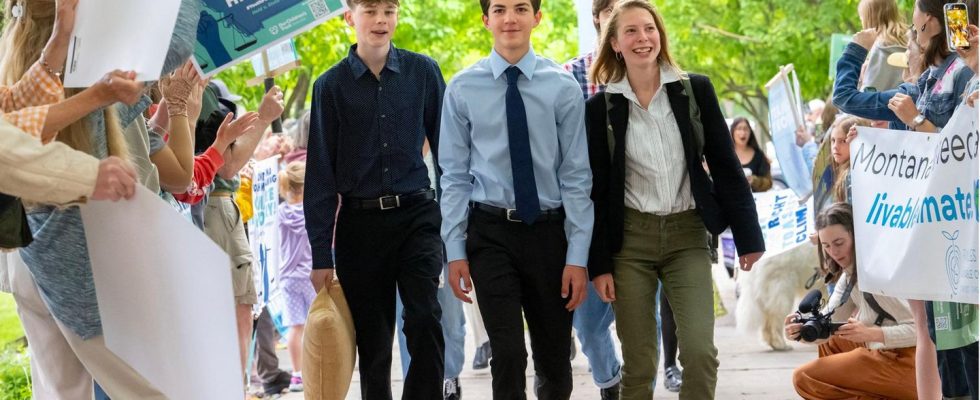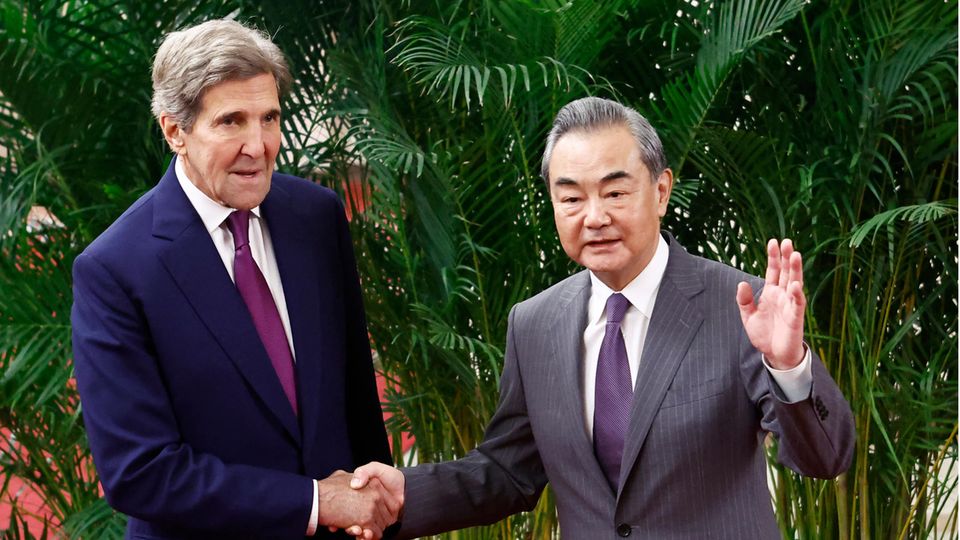questions and answers
Children sue the US state of Montana for more climate protection – and win. What are the implications of the verdict?
16 children and young people sued the state of Montana – and were right.
© Robin Loznak / Our Children’s Trust / AFP
The effects of climate change are threatening livelihoods, including in Montana, USA. 16 children and young people sued for their state-guaranteed right to a healthy environment – and they were right. What makes the process so special and what are the consequences of the verdict?
It is a historic success in terms of climate protection: For the first time, a judge in Montana ruled that the US state violated the right of several plaintiffs to a clean and healthy environment – 16 children and young people were brought to court. The judgment could make waves in further processes. What is special about the “Hero v. Montana” procedure? And what might follow the verdict? The star answers the most important questions.
Who sued?
A total of 16 plaintiffs came together to hold the state in the western United States accountable. The special feature: they were between 5 and 22 years old when the lawsuit was filed and come from families whose work and culture are significantly influenced by extreme weather events such as droughts and forest fires. The lead plaintiff was Rikki Held. Her parents own a ranch in the Montana countryside. In the process, she described how the heat, drought and forest fires in particular restricted her work. In one particularly bad wildfire season, several overhead power lines were destroyed, leaving her family without electricity for a month and resulting in the death of several cattle. “I remember … ash fell from the sky, people from the city were evacuated,” she said on the witness stand. The family had to close their motel for a long time.
Sariel Sandoval, who was a minor when the lawsuit was filed, is of the Salish and Kootena indigenous tribe. She testified in court that the life of the indigenous peoples would be significantly affected by less snowfall, since native plants no longer grew and rituals of the tribes could no longer be carried out.
On what basis was the complaint filed?
Montana’s constitution is considered one of the “greenest” and most environmentally friendly in the country. The state statute states: “All human beings are born free and have certain inalienable rights. These include the right to a clean and healthy environment (…)” The main point of contention in the process was the constitutionality of the provisions of the Montana Environmental Policy Act (MEPA ), which prohibits the state from using environmental assessments to emit Greenhouse gases to be considered as a point of criticism.
Why did children attack Montana?
In his opening statement, a plaintiff’s attorney said the lawsuit was about “equality for children and that they now need extraordinary protection from the extraordinary dangers of fossil fuel pollution and the climate crisis that their state government is exposing them to.” In the course of the trial, the court examined the extent to which children and young people could be particularly affected by the consequences of climate change. Finally, the judgment stated that the plaintiffs had proven that, as a young population, they were “disproportionately affected by fossil fuel pollution and the effects of climate change”. Thus, the responsible judge confirmed that actions of the state of Montana indirectly harm the children and young people and are therefore unconstitutional.
What does the judgment mean for the future?
“Hero v. Montana” is the first climate lawsuit based on a state constitution to be upheld by a court. The lawsuit was the first of several nationwide to go to trial.
According to information from the “Guardian”, there are laws in more than 150 countries around the world and in several US states that guarantee citizens the right to a healthy environment. So the ruling could encourage people around the world to sue countries and states for pollution
Within the USA, “Hero of Montana” could serve as a precedent for further climate processes. Judges who conduct similar processes in the future look very closely at what is happening in other states, an expert on environmental law at the University of California Berkley told the US news channel “CNN”. “It’s a signal to judges in other states that these cases might not be so far-fetched after all.”
It is still unclear whether processes of this type lead to more climate protection. However, the fact that a court has now held a state responsible for the suffering of children and young people as a result of climate change has brought the consequences of global warming into the focus of politics. The non-profit law firm Our Children’s Trust, which represented the plaintiffs in Montana, is engaged in further federal litigation with the US government. In the case of Juliana v. United States, however, the trial has not yet begun.
Sources: “cnn”, “CNN”, “The Guardians”, “Our Children’s Trust”, Climate Change Litigation Databases


